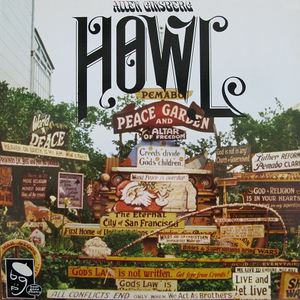
Published on Apr 1, 1998
Having a member of “the Pepsi generation” try and explain poetry
from one of the fathers of “the Beat Generation” is almost like
having Andrew “Dice” Clay be the keynote speaker at the national
convention for NOW. The generation gap between myself and the works
of such poets as Jack Kerouac, William S. Borroughs and Allen
Ginsberg might keep me from understanding exactly what the poet was
trying to say. (Boy, had I said this in my high school English
Literature classes, I would have flunked for sure.)
So when Fantasy Records sent me the first CD release of
Ginsberg’s classic album
“Howl” And Other Poems, I have to admit I was hesitant about
listening to it. It’s not that I hate poetry – some of the best
works I’ve heard have been in modern-day poetry “slams” held around
Chicago. But I didn’t know both what to expect from Ginsberg and
how I should react to his works and words.
Truth is, you don’t have to understand exactly what Ginsberg is
trying to say – hell, you don’t have to
agree with a word of it. But
“Howl” And Other Poems is a monument to the joy of the
English language, the melody of its words – and the freedom of
expression we so often take for granted.
A poem that found itself the center of a Supreme Court case
deciding what defines obscene or pornographic work, “Howl” is an
auditory landslide on your brain. Twenty-plus minutes of Ginsberg
praising his generation’s co-patriots while damning the system that
was threatening to wreck havoc on society in general. The language
contained herein could be seen as strong – but frankly, it’s
nothing compared to some of the shit that passes for “music” today.
It’s hardly titillating, even scandalous, in 1998, but in the
mid-’50s, hearing words like “cock,” “balls,” “cunt” and “fuck” in
poetry was a lead brick over the head of the literature snobs.
But those who cried “foul” over the language missed the point
Ginsberg was trying to make. He was speaking in the vernacular of
the beatniks, the ones who got the message the rest of us missed.
That’s too bad, ’cause the message of Ginsberg was delivered for
all of us – his words were supposed to serve as a verbal alarm
clock in the face of a happy facade about life we had built after
World War II. His words were those of disenchantment, and a call to
action – if only more people alive at that time had listened.
Make no mistake, “Howl” is a difficult (albeit quick) listen –
and “Footnote To Howl” makes it a little more difficult, but is a
logical progression for Ginsberg.
Of the remaining eight poems on
“Howl” And Other Poems, probably the best-known are “Kaddish
(Part 1),” a verbal tribute to all those we’ve loved and lost and
the demons they faced in life, and “America,” a scathing diatribe
against the Cold War image of our country (as well as historical
references to Russia and the early days of Communism).
The short poems (such as “In The Back Of The Real”), which clock
in at under a minute each, don’t seem to be effective tools for
Ginsberg to deliver his messages. Others, like “Transcription Of
Organ Music,” are works which welcome you to sit back and just be
taken into the world that Ginsberg pined for.
While I don’t think that
“Howl” And Other Poems is an album which is geared to race
toward the top of the “Billboard” charts, it is a powerful portrait
of the Beat Generation circa 1959. The recording quality of a few
tracks (recorded in Chicago at the “Big Table Reading”) is shaky,
at best – and one volume drop almost makes you think that a certain
word has been “bleeped”. (It wasn’t – I found a copy of “Howl”
elsewhere on the Internet, and the word was indeed “king”. The
volume drop was just a coincidence.) The studio work is of
incredible quality – one almost wonders if these pieces were indeed
recorded in 1959 or right before Ginsberg’s death.
“Howl” And Other Poems might have a limited audience, but
it’s worth investing the time and brain power to get through this
disc – if only to experience Ginsberg’s hypnotizing delivery for
the very first time like I did. Any student who is studying “Howl”
or Ginsberg would be wise to check this disc out – reading the
words on paper is one thing, but hearing them from the author the
way they were meant to be delivered is another.